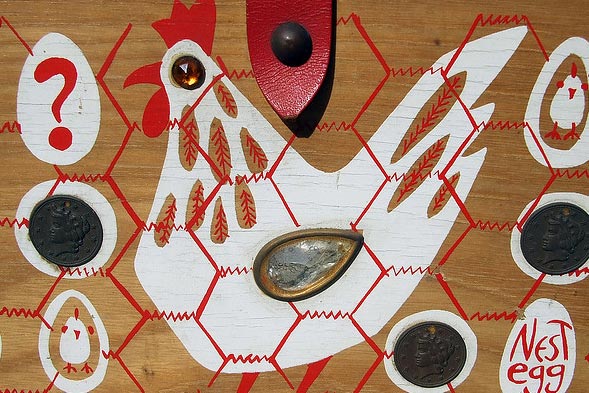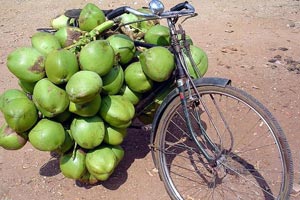
Flickr/<a href="http://www.flickr.com/photos/dennajones/" target="_blank">daisybush</a>
The chickens pictured on the egg producer Chino Valley Ranchers’ Simply Organic site look pretty happy. And from the description of their digs, it sounds like they’d have good reason to be: “When you walk into the chicken houses and you see all the birds scratching around in the dirt, running around, flapping their wings and hear the soft clucking from each of them, you can feel their contentment,” the copy below the little fuzzballs reads. “It is the way nature intended.”
An industrial henhouse jam-packed with 36,000 birds, on the other hand, is probably not “the way nature intended.” But that is exactly what investigators from the organic food advocacy group Cornucopia Institute found when they visited a Wisconsin henhouse that supplies Chino Valley Ranchers with organic eggs.
And Chino Valley isn’t alone. A recent Cornucopia investigation revealed that conditions at many facilities that produce organic eggs are often just as crowded and industrial as those at conventional egg farms. And although US organic standards require outdoor access for laying hens, Cornucopia found that at many organic farms, “outdoors” often consists of nothing more than a tiny concrete screen porch adjoining the tenement-like henhouse.
Last year, a group of organic egg producers (listed below) signed a letter to the National Organic Standards Board opposing the rule that mandates organic operations to grant their chickens outdoor access. They argued that the rule put too much of a financial burden on producers; the Cornucopia report excerpts a comment that Bart Slaugh, Eggland’s Best‘s director of quality assurance, posted to the NASD: “The push for continually expanding outdoor access and decreasing protection needs to stop,” writes Slaugh.
Cornucopia plans to file an official complaint to the USDA about the conditions at four farms (listed below), including Hillandale Farms, one of the culprits in the recent salmonella outbreak. While it hasn’t been proven that organic eggs are less likely to be contaminated with salmonella than conventional eggs, Cornucopia cofounder Mark Kastel believes that crowded factory-farm conditions can breed disease. “If you are living in these filthy conditions it takes a tremendous toll on your immune system,” he says. “And when you are dealing with those incredibly huge industrial scales, you can’t pay attention to the health of individual birds.”
Cornucopia rates major organic egg producers it investigated on this scorecard. (The setup is a little confusing, since the lowest scorers were those that refused to participate in Cornucopia’s survey, not the farms where the most egregious violations were found. That’s because Cornucopia rightly believes that producers of organic food should be transparent about their operations.) Here’s a list of the organic egg producers that Cornucopia is filing a complaint against, plus the companies that signed the letter opposing outdoor access for chickens:
Egg producers against which Cornucopia is filing a complaint:
The Country Hen (Hubbartson, Massachusetts)
Hillandale (Spring Grove, Pennsylvania)
Petaluma Farms (Petaluma, California)
Paul Fuenger Farm (Genoa, Wisconsin)
Egg producers that signed a letter opposing outdoor access for chickens as an organic standard:
Cal-Maine Foods
Delta Egg Farms
Dixie Egg Company
Fassio Egg Farms
Fort Recovery Equity, Inc.
Herbruck’s Poultry Ranch (green meadow organics) in Saranac, Michigan
Kreher’s Farm Fresh Eggs, LLC
Nature Pure, LLC
Oakdell Egg Farms
Ritewood, Inc.
If you’re curious about where to find eggs raised in a healthy environment, check out Cornucopia’s full scorecard here.
Correction: An earlier version of this article wrongly listed R.W. Sauder, Inc. and Chino Valley Ranchers organic facility in Idalou, Texas as signatories of the letter opposing outdoor access for chickens. These two companies did not sign that letter. We regret the error.














